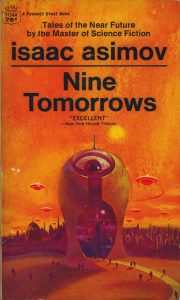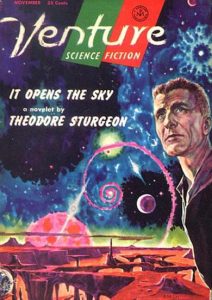 I said at the first of the year that I was going to post about different Asimov stories. The semester has gotten off to a hectic start, and I’m a little behind on things.
I said at the first of the year that I was going to post about different Asimov stories. The semester has gotten off to a hectic start, and I’m a little behind on things.
I’ve had a copy of Nine Tomorrows sitting on my shelf for years but have never gotten around to reading it, although I’ve read some of the stories it contains when I read some other anthologies. As best I can recall, this was one of the first science fiction paperbacks I saw when I started reading science fiction way back in late elementary school. For reasons I no longer recall, it wasn’t one of the first I bought, but that Richard Powers cover left an indelible impression on my mind.
The story I decided to read was “I’m in Marsport Without Hilda”. I’ve always liked the title. It gave me an impression of a spaceman alone on an alien world pining for his lover.
Turns out that impression was only part right. [Spoilers below the fold.]
There’s a spaceman on an alien world, but he isn’t pining for his love. He’s taking advantage of her not being there. Or at least he’s trying to. And I’m not sure if “his love” is the best description of his wife.
Short synopsis, Max, an agent for the Galactic Service, has landed at Marsport and is due some leave. This is a regular thing with his schedule. What normally happens is his wife, the titular Hilda, joins him along with her mother. Marsport isn’t that kind of place. It’s like Vegas. You don’t want your mother-in-law, or your wife, spoiling your fun.
Only this time, he gets word that Hilda’s mother is ill. Max immediately calls up a lady of his acquaintance and sets up a date. It’s implied but not explicitly stated that this woman is of negotiable virtue.
No sooner does he do this than his boss catches him and tells him that there’s an emergency and Max is the only agent available. There’s a prominent businessman smuggling a deadly drug. The wrinkles are that there are three prominent businessmen about to board a flight to Capella, and the Service doesn’t know which one it is. Max has to find out and find out soon.
He has to call and postpone his date.
Travel between star systems requires travelers to take a certain drug called Spaceoline in order to withstand the space sickness that accompanies space travel. The dangerous drug is a variation of Spaceoline that his highly addictive.
One of the side effects of Spaceoline is to make people babble and act goofy. Sort of like a truth serum. The smuggler hasn’t taken it because it would endanger his smuggling. He might disclose that he has it.
The problem Max encounters when he sits in the departure lounge with the three men is that one of them is faking the side effects of Spaceoline, just like Max is. Time is short, and the clock is ticking. Max is eager to get to his date. And that turns out how he catches the smuggler.
 He begins to describe what he and this woman are going to do. Since this story was published in the November 1957 issues of Venture Science Fiction, we don’t actually get any details. Today, who knows what kinky stuff would be described. Max doing this isn’t inconsistent with the effects of Spaceoline. Babbling is common. Reacting to this type of stimulus isn’t. The smuggler gives himself away when gets all hot and bothered by Max’s descriptions.
He begins to describe what he and this woman are going to do. Since this story was published in the November 1957 issues of Venture Science Fiction, we don’t actually get any details. Today, who knows what kinky stuff would be described. Max doing this isn’t inconsistent with the effects of Spaceoline. Babbling is common. Reacting to this type of stimulus isn’t. The smuggler gives himself away when gets all hot and bothered by Max’s descriptions.
Max is given a large cash bonus and is heading out to spend it on his date, when who should appear but Hilda. Her mother insisted she join Max on Mars. Max’s boss, helpful fellow that he his, tells her where to find him and that he has the bonus. So much for Max having a good time in Marsport without Hilda.
I found this to be an interesting story for the following reason. Isaac Asimov ran around on his wife quite a bit. I don’t know the details and the time frame, but I do know he had a number of what he called girlfriends, because Fred Pohl (I think) wrote about Asimov bragging about which hotel he took them to. It might have been about the time this story was written, give or take a few years.
Could this story have been written because Asimov was frustrated with his wife interfering, intentionally or otherwise, with his love life? I don’t know that was the case, but it’s an interesting possibility. The frustrations expressed by Max are certainly detailed enough to make me think Asimov may have been drawing on personal experience a bit when he wrote this one.
